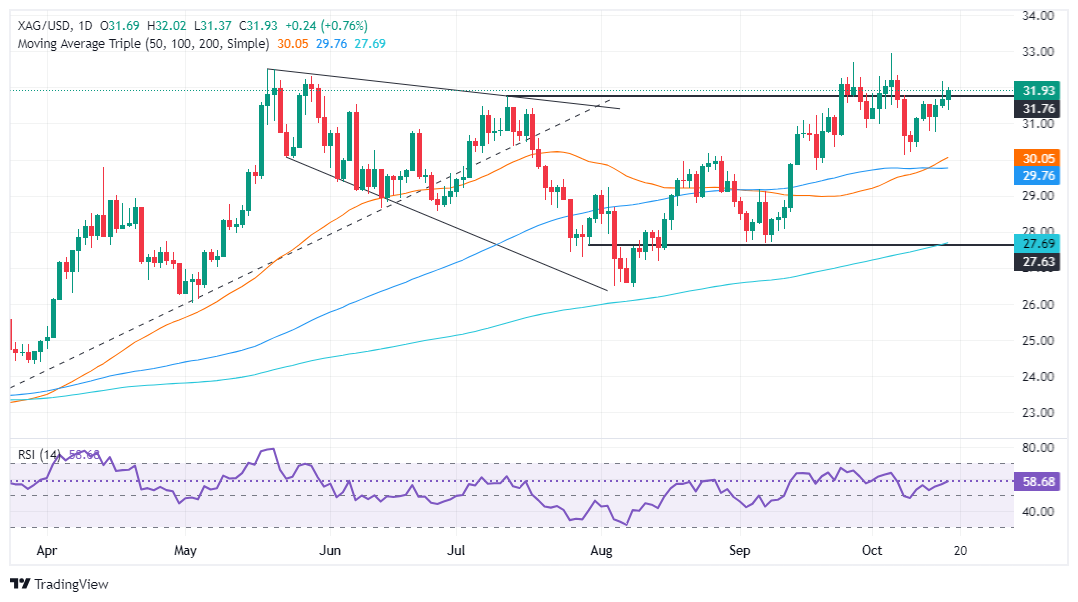Silver Price Forecast: XAG/USD extends gains, buyers target $32.00

- Silver rises third day; capped below $32.00 amid high US Treasury yields.
- Momentum suggests more gains; resistance eyed at $32.17, May high at $32.51.
- Support at $31.37; break below could lead to retests of $30.76, October low $30.12.
Silver’s price extended its gains to three straight days yet remains below the $32.00 figure as US Treasury yields cap the grey metal’s advance. This, along with a buoyant US Dollar, didn’t deter the precious metal from advancing higher, and it consolidated at around the higher bound of the $31.50/$31.90 range. The XAG/USD trades at $31.90, above its opening price by 0.80%.
XAG/USD Price Forecast: Technical outlook
After plunging almost vertically from a year-to-date (YTD) peak of $32.95 to $30.12 within three days, the non-yielding metal is now recovering, with buyers targeting a potential test of the $33.00 level.
Silver’s recovery from plunging almost vertically from a year-to-date (YTD) peak of $32.95 to $30.12 within three days continued on Thursday. Momentum hints at buyers gathering steam, as depicted by the Relative Strength Index (RSI). Hence, the XAG/USD path of least resistance is tilted to the upside.
That said, the first resistance would be the $32.00 figure, followed by the October 16 high at $32.17. Once those levels are surpassed, the next stop would be the May 20 swing high at $32.51 before challenging the YTD high at $32.95.
Conversely, if XAG/USD slips below $31.37, Silver could drop to the weekly low of $30.76. If surpassed, this would clear the path to challenge October’s 8 low of $30.12.
XAG/USD Price Action – Daily Chart
Silver FAQs
Silver is a precious metal highly traded among investors. It has been historically used as a store of value and a medium of exchange. Although less popular than Gold, traders may turn to Silver to diversify their investment portfolio, for its intrinsic value or as a potential hedge during high-inflation periods. Investors can buy physical Silver, in coins or in bars, or trade it through vehicles such as Exchange Traded Funds, which track its price on international markets.
Silver prices can move due to a wide range of factors. Geopolitical instability or fears of a deep recession can make Silver price escalate due to its safe-haven status, although to a lesser extent than Gold’s. As a yieldless asset, Silver tends to rise with lower interest rates. Its moves also depend on how the US Dollar (USD) behaves as the asset is priced in dollars (XAG/USD). A strong Dollar tends to keep the price of Silver at bay, whereas a weaker Dollar is likely to propel prices up. Other factors such as investment demand, mining supply – Silver is much more abundant than Gold – and recycling rates can also affect prices.
Silver is widely used in industry, particularly in sectors such as electronics or solar energy, as it has one of the highest electric conductivity of all metals – more than Copper and Gold. A surge in demand can increase prices, while a decline tends to lower them. Dynamics in the US, Chinese and Indian economies can also contribute to price swings: for the US and particularly China, their big industrial sectors use Silver in various processes; in India, consumers’ demand for the precious metal for jewellery also plays a key role in setting prices.
Silver prices tend to follow Gold’s moves. When Gold prices rise, Silver typically follows suit, as their status as safe-haven assets is similar. The Gold/Silver ratio, which shows the number of ounces of Silver needed to equal the value of one ounce of Gold, may help to determine the relative valuation between both metals. Some investors may consider a high ratio as an indicator that Silver is undervalued, or Gold is overvalued. On the contrary, a low ratio might suggest that Gold is undervalued relative to Silver.
